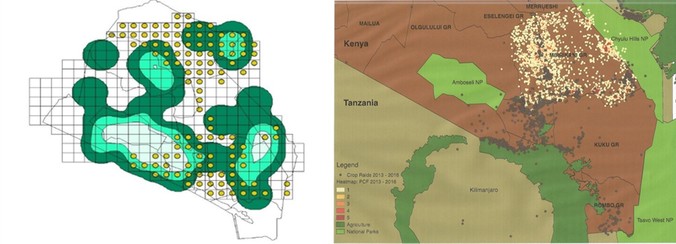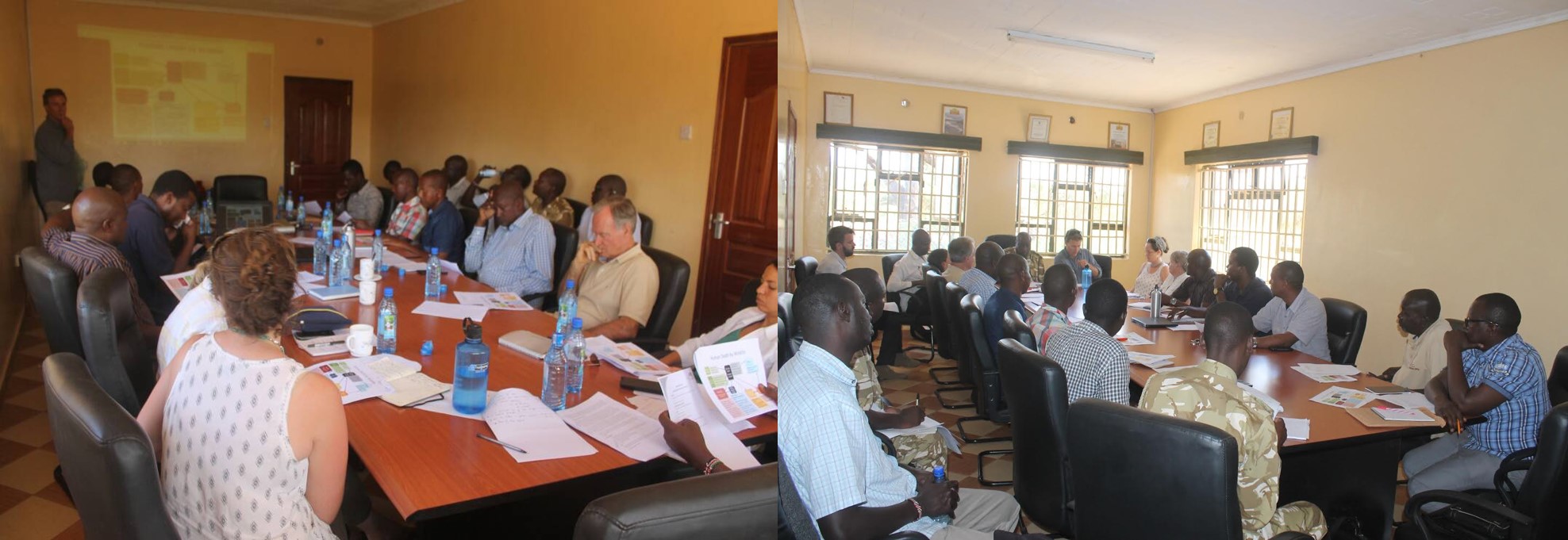 Distribution of elephants and farms in eastern Kajiado County (left). The green shows elephant’s distributions, the lighter green being areas of highest concentration. The yellow dots show the distribution of small farms (data from ACP). Incidents of human-wildlife Conflict in the Amboseli area for 2016 (right) showing data from Big Life.
Distribution of elephants and farms in eastern Kajiado County (left). The green shows elephant’s distributions, the lighter green being areas of highest concentration. The yellow dots show the distribution of small farms (data from ACP). Incidents of human-wildlife Conflict in the Amboseli area for 2016 (right) showing data from Big Life. The severity of conflict between wildlife and people intensified with scanty short rains in November and December. The conflict was the main topic of discussion at a meeting of the Borderlands Conservation Initiative, held in Nairobi in 1st and 2nd of March. Wardens, county representatives, conservation organizations and researchers reviewed the scale of conflict in Kajiado and Narok counties and mitigation measures. Amboseli was highlighted as the best documented case of the rising conflict as poaching abates and wildlife expands into human habitation. The following excerpts summarize the findings of BCI meeting:
Between 2013 and 2016, 40 human deaths and 300 injuries caused by wildlife were reported in Kajiado, along with 1,700 crop raiding incidents. Many incidents go unreported by farmers who feel there is no hope of getting any compensation. Big Life noted that the growing number of human deaths from elephant attacks has caused a spate of retaliatory spearing by young warriors. Only one elephant was lost to poaching in in Amboseli during 2016, compared to 24 to 30 elephants killed in retaliation. Big Life attended 145 crop raiding incidents in Amboseli area last year.
The growing overlap of elephants and small-scale farms (shambas) was presented by the Amboseli Conservation Program:
Big Life profiled the distribution of conflict incidents for 2016. Big Life deploys 60 of the 350 Amboseli community scouts in conflict mitigation. Many farms are isolated and difficult to protect. The average damage per person is 0.5 acres and the interception rate on crop-raiding elephants on the order of 60 percent. Retaliatory incidents have risen sharply, posing dangers to scouts and rangers who intercede.
The BCI meeting concluded that the growing conflict needed to be tackled locally rather than rely on government compensation, and through land use planning at a county and group ranch level. Amboseli was highlighted as an example of the steps needed to address human-wildlife conflict.
A follow-up meeting of the Amboseli Human-Wildlife Conflict Committee set up in December was held at the Kenya Wildlife Service headquarters on the 22nd March. The meeting, convened by the Amboseli Ecosystem Trust, included the district police and National Intelligence Service, in addition to KWS, community leaders, conservation organizations and researchers.
The meeting reached a consensus on a preliminary draft of rapid-responses protocols for dealing with human deaths and injuries caused by wildlife. Kenya Wildlife Service, as the agency responsible for wildlife, will set up a hotline for reporting incidents. Big Life, which has an area-wide radio network, will send out the alerts via Whats App to assemble the rapid-response group on site. The Amboseli Ecosystem Trust will sound out the communities on the protocols being drawn up by the Amboseli Trust for Elephants, Lion Guardians, Big Life, ACC, KWS and the County Wildlife Compensation Committee Chairman. ACP will set up technical group to compile a human-wildlife conflict database.
Other measures to address the conflict are underway. Conservation organizations, Amboseli Ecosystem Trust and KWS have held meetings with warrior and youth groups in the Amboseli region to address the conflict:
- In January ACC gave start-up funds to launch conservation education outreach program in memory of Josh Kirinkol ACC US board member, aimed at engaging the younger generation of Maasai.
- ACC, funded by the Global Environmental Facility, is undertaking land use planning on Mbirikani, Kuku and Rombo group ranches. The land use plans zone each ranch into areas for settlement, farming, commerce, extensive livestock-cum-wildlife, ecotourism and conservancies.
- Big Life has completed 48 kilometers of an electric fence to protect the main farming areas east of Amboseli and along the foot-slopes of Kilimanjaro from elephant raids. The fence is proving highly effecting in keeping elephants out of farms.

 RSS Feed
RSS Feed
